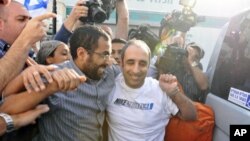The controversial prison release of Hagai Amir, the brother of the man who assassinated Israeli Prime Minister Yitzhak Rabin, has stirred emotions in Israel and stoked memories of a dark chapter in the nation’s history.
Amir was confronted by angry Israeli peace activists, who shouted "Disgrace! Disgrace!," as he was freed from prison Friday after serving 16 years. Amir was convicted of being an accomplice of his brother Yigal Amir, an Orthodox Jew who assassinated Rabin in 1995. The brothers opposed his policy of trading land for peace with the Palestinians.
In a brief statement to reporters, Hagai Amir showed no remorse. “I am proud of what I did,” he said.
The decision to free him has prompted the public to revisit Rabin's assassination -- an event that deeply divided the nation. The Israeli left, which supports the peace process with the Palestinians, accused the right of creating an atmosphere of incitement that led to the murder.
At the prison, left-wing protesters said Amir is a threat to Israel’s democracy and should have spent his life behind bars.
“We will not forgive or forget,” said Barak Selah, a young activist in the liberal Meretz party.
But Amir had his supporters too, including Noam Federman, a Jewish settler from the biblical West Bank town of Hebron, who said Rabin’s policies led to Palestinian terrorist attacks that killed hundreds of Israelis. Federman said while he doesn't support the murder of the prime minister, he will not weep for him either.
Sixteen years after the assassination, Yitzhak Rabin remains an icon of Israel’s peace camp and a symbol of the national rift about the concept of land for peace.
News
Brother of Rabin Assassin Released from Israeli Prison




